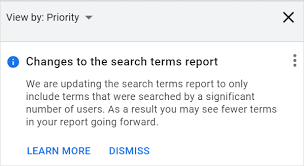
The Breakdown: Google Removes Search Terms Which May Impact Paid Search
Some advertisers may have noticed this notification in their Google Ads platform:

With its increasing focus on end-user privacy, Google Ads announced that it would omit search terms with a low number of impressions from its reports. This update will make it more difficult for marketers to single out individuals who are engaging with their ads.
Google Has Started Reducing Search Term Reports
Previously, the Search Terms report would show marketers all search terms that triggered an ad and how many impressions, clicks, and conversions those terms yielded. This report would also indicate whether broad match modified triggered a term—and, as we all know, that’s where a lot of the spend can accumulate.
Now, with Google’s update to Search Terms, marketers won’t see the entire picture. While the need for stronger privacy is understandable, it does leave some marketers with incomplete data, with knowledge gaps that they must fill in on their own.
Google states they are making this update to,
“to maintain our standards of privacy and strengthen our protections around user data…”
The impact of this update will depend on what Google defines to be a keyword with “significant” impressions.
What This Means for Marketers
- When you visit your Search Terms report, expect the total dollars spent isn’t going to be fully represented in the search terms shown. This means you’ll be losing insights into some new keyword opportunities, negative keyword opportunities, and lead quality.
- You won’t be able to see what specific keywords users converted from if the keyword was a long-tail variation. This will make it harder to identify irrelevant keywords you’re paying for.
- You’ll be losing some visibility into where your budgets are going, what search terms you’re paying for, and how much you’re paying (see the screenshot below as an example).

What Marketers Can Do About It
- First and foremost, proactively adding in negative keywords has never been more important! Since you’ll be losing visibility for those low-intent keywords, it’s important to negate any keywords that you know would automatically disqualify a lead or that aren’t related to your business.
- Exact and phrase match types are going to be more useful than ever (not that they weren’t important before). If you’re like me, I try to include broad match modified (BMM) keywords in campaigns where I feel there’s an opportunity for additional volume, especially if it’s a low-volume campaign. However, since that match type can draw in a wide spectrum of irrelevant keywords, it’s going to be difficult to see some of those terms with this update. I still think broad match modified terms are important to include (assuming your cost per click and cost per lead are reasonable). But keep a closer eye on your data when you use it, and add exact and phrase match options with priority bids to capture that high-intent search volume.
Pro Tip: It’s now more important than ever to research possible negative keywords to add rather than to rely on Search Term reports.
More News to Come
We’re always looking out for important digital marketing updates and proactively finding the best ways to deal with them. Stay tuned for more of The Breakdown to stay ahead of the trend and adapt to new situations.
Leave your comments and questions below. Or contact us. We’ll be sure to answer them!
Most newsletters suck...
So while we technically have to call this a daily newsletter so people know what it is, it's anything but.
You won't find any 'industry standards' or 'guru best practices' here - only the real stuff that actually moves the needle.







